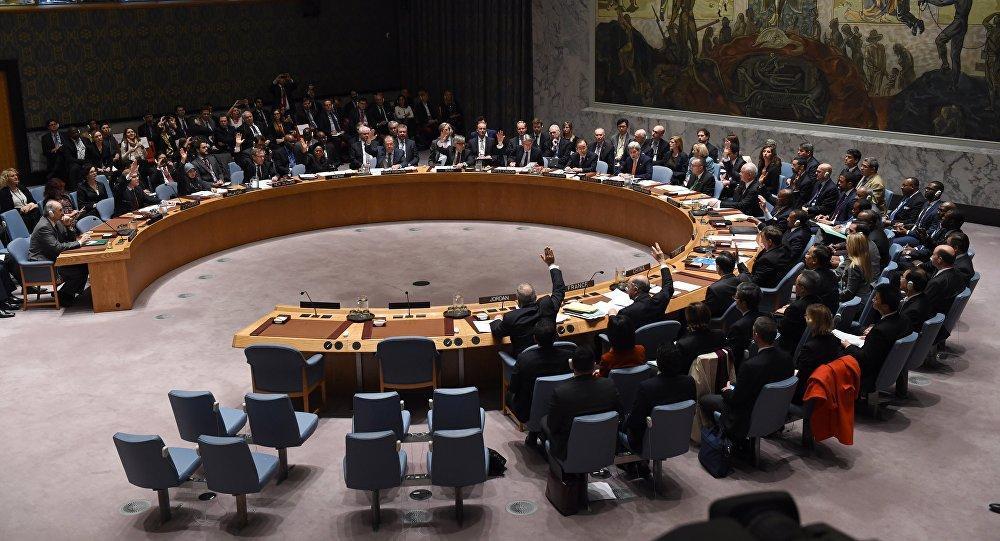
Turkey welcomed on Feb. 25 a United Nations Security Council resolution demanding a 30-day truce across Syria to allow aid access and medical evacuation, while adding that the cease-fire would not affect the ongoing “Operation Olive Branch” in Syria’s Afrin district.
“We welcome the resolution adopted by the U.N. Security Council today in response to the worsening humanitarian situation all across Syria, in particular in Eastern Ghouta, that demands the cessation of hostilities without delay,” Foreign Ministry spokesman Hami Aksoy said.
“Turkey, while continuing to extend humanitarian assistance to the Syrian people to relieve their suffering and support the efforts of the international community, particularly the U.N., will at the same time maintain efforts to end the conflict that lies at the core of the humanitarian crisis in Syria and will remain resolute in fighting against the terrorist organizations that threaten the territorial integrity and political unity of Syria,” he added.
The U.N. Security Council adopted the resolution on Feb. 4, as one of the deadliest air assaults of the seven-year war pounded the Eastern Ghouta district last week.
However, clashes and regime strikes continued in the area on Feb. 25 despite the U.N. call, a monitor said.
Clashes on the edges of Eastern Ghouta between Syrian regime forces and rebels killed at least 13 members of pro-regime forces and six fighters from the Jaish al-Islam rebel group, the Britain-based Syrian Observatory for Human Rights said.
The main rebel groups in Eastern Ghouta, where more than 500 people have died since the bombing campaign was launched a week ago, welcomed the U.N. vote and said they would abide by the cease-fire.
Ankara, meanwhile, said that the U.N. call does not cover Turkey’s military operations in the Afrin region in Syria’s north.
Turkey launched “Operation Olive Branch” on Jan. 20 to remove Syrian Kurdish People’s Protection Units (YPG) militants from the bordering Afrin region.
Turkey considers the YPG as an offshoot of the outlawed Kurdistan Workers’ Party (PKK), hence a terrorist group.
Sources in Ankara told daily Hürriyet that the scope of the cease-fire resolution cannot include “Operation Olive Branch” since “Turkey is not a party in the conflict and is only carrying out an operation in order to secure Turkey’s territorial integrity and border safety.”
“It is an operation carried out in accordance with U.N. decisions which protect the right of self-defense against terrorism that threatens border safety and the territorial integrity of Turkey,” the sources said, recalling the Turkish military’s previous statement emphasizing the U.N. Security Council’s previous decisions concerned “the right of self-defense.”
“The operation is carried out in respect to Syria’s territorial integrity within the framework of the right of self-defense under U.N. Charter Article 51, and UNSC’s decisions number 1624, 2170 and 2178,” the military had said.
Russian President Vladimir Putin, meanwhile, discussed the Syrian crisis with his French and German counterparts, Emmanuel Macron and Angela Merkel, on Feb. 25, the Kremlin said.
The leaders, who spoke by phone, highlighted the importance of common efforts to implement the cease-fire and agreed “to speed up ‘information exchange’ over Syria,” the Kremlin said.
World leaders have expressed outrage at the plight of civilians in Eastern Ghouta.
The enclave is surrounded by government-controlled territory, and its 400,000 residents are unwilling or unable to flee the deadly siege.
Food supplies have been running dry, with bread no longer available on local markets.
The cornered rebels in Eastern Ghouta have been firing back into Damascus, where six civilians were wounded on Feb. 24, Syrian state media said.
Around 20 people have been killed in eastern districts of the capital since Feb. 18, according to Syrian state media, and many residents have sought temporary accommodation elsewhere for fear of a further intensification of the fighting.